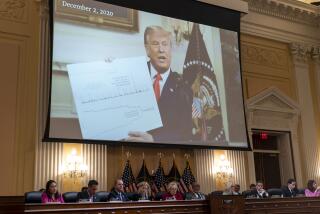A Time for Cooler Heads
In the Constitution, this country’s founders sought to balance the populist leanings of a more volatile House of Representatives with the wisdom and stability of the Senate. This was especially true in the matter of impeachment, in which House members, it was feared, might be swept away by “some irregular passion . . . or misled by the artful misrepresentation of interested men.” So James Madison wrote in The Federalist.
Thus, the House would serve as the accuser, and the Senate, a “temperate and respectable body,” would hold the power of judgment. Now, 212 years after Madison wrote Federalist No. 63, it is heartening to see the Senate acting in a temperate and respectable fashion as it searches for an equitable resolution to the impeachment of President Clinton. As the passions of the House debate cool, senators of both parties appear to agree that a prolonged Senate trial with testimony from witnesses such as Monica S. Lewinsky and Linda Tripp would not serve the nation.
The reasonable course is to fashion a strong resolution of censure that would require Clinton to acknowledge, at last, that he lied under oath. He would be subject to the severest of condemnation by the people of the United States, as represented by their members of Congress. He might even be forced to pay a fine to compensate the nation for some of the cost of the prolonged investigation by independent counsel Kenneth W. Starr. Under such a plan or a similar one, this long, sorry matter could be settled in early January and the president and Congress would return to the work of the nation.
Many Clinton opponents insist that his case must go to trial in the Senate, although there is no constitutional requirement that a trial be conducted. They talk of calling long lists of witnesses, including some who did not even figure in the House debate on articles of impeachment. But what more can be learned than we already know from Starr’s exhaustive investigation? What more needs to be learned?
It’s evident that the president lied, under any reasonable definition of the word. Considering that a Senate trial almost certainly would not convict Clinton, an act that requires a two-thirds vote of the body, it can only be assumed that his accusers’ goal is to further embarrass the president in hopes that public demand for him to resign will escalate. But given Clinton’s rise in the polls after the House vote, that prospect may be wishful thinking.
On the other hand, Clinton must not think the polls represent any measure of vindication for him or justify his supporters mincing words in a censure resolution. The White House’s smug reaction to GOP losses in the November election obviously strengthened the Republican resolve to go through with impeachment. Any similar reaction to the seriousness of the situation now would not help Clinton’s cause.
For those who insist on a trial, let it begin with House prosecutors laying out their charges and Clinton’s laywers summarizing their defense. Proceedings could be suspended at any point by a majority vote of the Senate, which then could move to consideration of a censure resolution. To carry on beyond that would only serve those who thirst for further revenge.
Vengeance must not be the goal here. The nation wants a repentant president to admit his wrongs and suffer the appropriate penalty. Then it wants the people’s government to get back to business.
More to Read
Get the L.A. Times Politics newsletter
Deeply reported insights into legislation, politics and policy from Sacramento, Washington and beyond. In your inbox three times per week.
You may occasionally receive promotional content from the Los Angeles Times.










